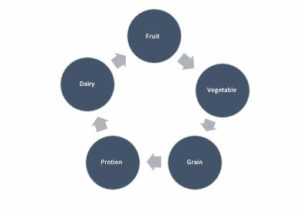
School-age is the most appropriate time for your child to learn healthy nutrition, and get to know good habits; as in this age, your child becomes more independent as they receive pocket money, learn calculations and explore themselves as they learn about their favorite choices. Your child needs an assorted nutritional feeding schedule to follow a balanced diet, whereas the volume of the physical activity practiced in a day is an important part of the nutrition they need. While your student is being active, having multiple snacks during the day is key to sustain their high energetic levels, usually, snacks are needed in the morning, in breaks, and after school, on an everyday basis.
Teaching students in a developed and caring environment is one of our main responsibilities in Rowad AlKhaleej international schools, where we blend activities that build and boost their motivation to pursue healthy habits.
What should a child eat on a school day?
In most schools, there is a canteen that offers numerous food options. Rowad AlKhaleej schools follow governmental guidelines to encourage healthy food choices. Some foods could be high in empty calories and in price, and low in nutrition, therefore the most suitable for your child to learn favored healthy eating habits is by a prepared meal from home.
Healthy meal suggestions for your child
- Peta bread or Arabic bread with any unprocessed meat (protein).
- Cheese slices, whole wheat crackers, fresh vegetables, dried vegetables.
- A cup of milk and one of water.
Food to restrict
- Processed meat (salami, pressed chicken, mortadella …)
- Fruit bars, fried chips/crackers.
- Added sugared foods.
- Deserts with low-calorie
- Energy and carbonated drinks.
The importance of breakfast for your child
Our bodies change food into energy in morning periods and throughout this process, the body burns calories. To prepare your child for a school day, they must have a good night sleep followed by a nutritious breakfast for your kid to enjoy an active physical state. Breakfast is the most important morning meal, for adults and children, therefore, be a role model you always wanted to be for them and fill up your breakfast with nutritional food, such as cereal with milk and fresh fruits and vegetables is a great way for a family to start their day.
Diet plan for children to promote healthy bones and intelligence
There are five food groups, that are then divided into sub-groups.

As the science of nutrition advances by time, while scientists discovered vitamins and minerals that make up our food “there is definitely more to discover”.
The Food grouping system is focused on whole meals rather than nutrients alone.
Sub-groups
- Fruits: whole fruits and fresh juice
- Vegetables: Dark Green veggies, Peas, Red and Orange Veggies, Beans, and Starchy vegetables. Other vegetables like Avocado, Mushrooms…
- Grains: Whole grains (whole wheat flour, oatmeal, cornmeal…) and refined grains (pasta, cake, white rice…).
- Protein: Seafood, Meat, Poultry, Eggs. Other forms of Protein such: Nuts, Seeds, and Soybeans.
- Dairy: Milk, Yoghurt and Cheese.
Children’s proper nutrition and diet
We must understand that there is a compelling difference between healthy diet and healthy eating habits. As our children grow older, it is difficult to control what goes in their bodies, however, this is your chance to expose your child taste to numerous types of food in a healthy fun manner. There is a profound feeling of participation and care when you allow your child to prepare a meal with you, therefore prepare a nutritious low calorie meal together and make it a habit! Since low calorie food equips your child to face daily activities, obstacles in balanced energy as this method aid their independence and boost their attention levels.
Your guide for the different age stages
1-2 years
Growth happens in the first stages of your child’s life more than any other stage. It is crucial to feed your child a mixture of healthy foods, hence, starting healthy eating habits from this stage will help in shaping their eating patterns for life.
Fill up your diet with healthy meals and forbid ones that contain empty high calories like drinks with added sugar, and some other types of meat such as processed meat, but, offer healthy protein like, full cream milk, it is better to exchange it with low fat when your child reaches 2 years. Milk is a critical factor to helping your child’s growth journey, as it promotes calcium and vitamin D that help build strong healthy bones.
Offer your child three main meals and 2(two) snacks, however, do not allow food at request, keep a planned schedule for both the meals and snacks so that your child can acknowledge eating in specific times of the day, and to prevent of obesity.
Tip:
Keep watching out for allergic reactions as your child is eating, children have more tendency to get food allergies and more if there was family history (eczema or asthma …).
3-4 years
In this stage your child tend to specify food that interest them and determine his preferred food taste, they have now grown enough to join your diet plan, however with small tummies, that’s why in these early ages children are likely to eat small meals repeatedly, you might also struggle to let them finish their meals and have to pressure in them to do so, or might also find them highly not interested in eating meat nor chicken. Your child now relies highly on solid food, but in this age they are inclined to eating carbohydrates, and sugared food; pasta, rice, bread, sweets…therefore, when introducing new type of food for your child, make sure you choose one type at a time.
Meal suggestions
Breakfast:
- Eggs (omelet) with chopped colored vegetables / 1tb.spn minced meat.
- Apple and Banana slices
- 1 cup of low-fat milk
Snack:
- Whole wheat crackers
- Dried fruits (fig, apricot).
5-14 years
- Your child in these ages should start to learn healthy eating habits and apply them often as they have enough sleep time for overall healthy growth and to prevent hormonal disturbance or obesity and chronic illnesses.
- Diversify your child’s protein intake from meat and seafood.
- Offer various types of vegetable and fruit salads
- Milk and dairy products (low fat)
You can cook other nutritional meals; Molokhiya, Kabsa (meat/chicken) such food is healthy with considering using minimum oil.
Important instructions to maintain your child’s weight
It’s crucial for your child to increase their weight, but is more important to offer them a healthy diet and prevent food with high calories that exist in packaged food with preservatives and added sugar like chocolates, sweets, and fried chips/food. As your child grows to become independent with their choices and is able to buy whatever is in his/her liking from the school canteen, you cannot control what goes in his body, however, you can definitely control and train your child to have healthy eating habits and to understand and acknowledge the importance of having a healthy diet.
